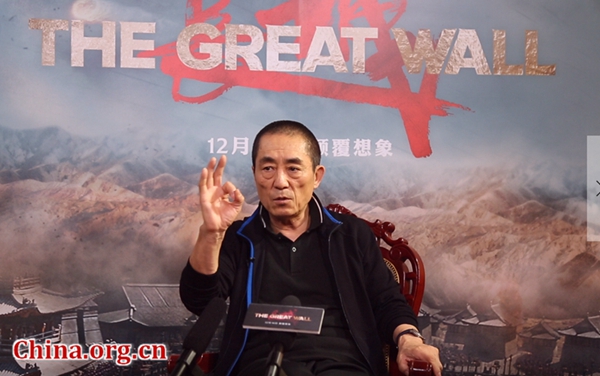Zhang Yimou: 'Great Wall' marks a change
china.org.cn / chinagate.cn by Zhang Rui, December 19, 2016 Adjust font size:
|
Zhang Yimou talks to China.org.cn in an interview about his new film "The Great Wall" in Beijing, Dec. 7, 2016. [Photo / China.org.cn] |
The film, co-produced by China Film Co. Ltd., LeVision Pictures, Legendary Pictures and Universal Pictures, reportedly cost US$150 million to make. This is Zhang's new vehicle of exporting Chinese culture.
The film was originally developed by Legendary Entertainment CEO Thomas Tull when he visited the Great Wall of China, a magnificient Chinese landmark. "He's a monster fan, and he was excited to see the ancient wall. So he thought, how about making up a story in which Chinese soldiers fight monsters and making it into a film?" Zhang said.
The project was developed for years by their joint venture company Legendary East, whose CEO, Peter Loehr, finally approached Zhang. "They were worried that I might laugh at the script," the director said, "but I accepted their offer. They were thrilled."
But it didn't mean the script is perfect, "There were many similar cliches in the script which happened before in other US-China co-productions, such as the leading roles having sex or so," Zhang remembered, "but I saw it as a chance. They came to me, which indicates the power shift in the world. China's national power and market have greatly improved so they have to pay attention. The world has changed. If it were 10 years ago, no way they would come to me. At the same time, Hollywood is drying up in originality; they need to explore new stories and new markets. "
Zhang was also attracted by some elements of the script such as gun powder, the Great Wall, and Taotie, the greed monster sourced from China's ancient myth compilation, "The Classic of Mountains and Seas." So he asked them if he could make some adjustments to script from his Chinese cultural perspective.
Peter Loehr arranged for Zhang to fly to Los Angeles to meet Thomas Tull. Legendary's executives respected Zhang's opinion and Chinese culture providing an opportunity for Zhang to eventually rework the script for another year.
Zhang said he studied how to make blockbusters and had no intention to defy Hollywood's production rules, which he said, had nurtured generations of audiences all around the world. But he still had to fight with the producers to save certain scenes which they deemed not important and not interesting to American audiences.
"In the film, there was a Chinese funeral," Zhang said, "Americans thought it to be unnecessary and wanted it removed. But I wanted to save it because it can show the Chinese spirit. So I persuaded them to let it stay."
This was just one example of behind the scenes fighting and compromise. "They respected me. I could do this due to my status in the Chinese film industry and because of their appreciation of me. If you are a small director, they would not bother to care about your opinions, they could just replace you."
For Zhang, the process of the collaboration in the Hollywood system was so difficult that Chinese audiences might not understand.
With the help of young director Frank Lin as his translator and assistant, Zhang, who doesn't speak and understand English, could direct Matt Damon, Pedro Pascal and Willem Dafoe. "The actor's performance is very delicate, it will be very hard to judge if they did a good job or not," he said. "I can only judge if the take is okay according to my eyes, my communication with Frank and my experience throughout the years."
Zhang hopes that one day, the world can line up to see Chinese films. "That is my ultimate hope, a Chinese film can be as profitable as the 'Transformers' franchise, and can be as influential as 'Star Wars'. World audiences are dying to see it. That is when Chinese films will really go out to the world. But, there's a long way to go."
Zhang Yimou believes that he is now the only Chinese director who understands so deep and so well how Hollywood works, after his work for "The Great Wall" during the past three years. "To export Chinese culture, you have to follow their format. You have to be careful and entertaining, you should not be too academic, otherwise it will not be efficient and accepted by foreign audiences. You have to succeed in this. If the film fails, your mission to export culture will fail too."
The director expected that world moviegoers can see "The Great Wall" as a standard Hollywood big production when it will debut in US theaters in Feburary 2017. "But they can also feel it has something different, something China. That's what I want to achieve."
"The Great Wall" has already hit Chinese theaters on Friday and will be released in the United States on Feb. 17, 2017.
